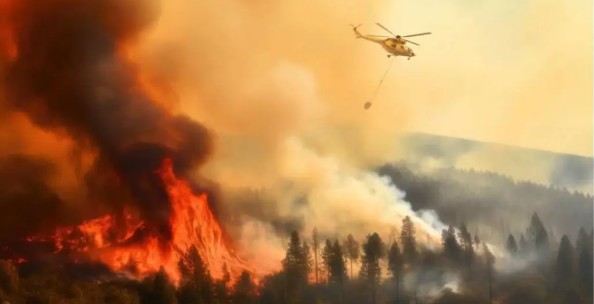- An expert from Corma stated that small and medium-sized landowners are the most affected, as they lack the resources to reforest if their property is destroyed by attacks or fires.
Ramón Figueroa, Deputy Manager of Fire Protection at Forestal Arauco and President of the Forest Protection Department of the Chilean Wood Corporation (Corma), explained that the cost of insurance for firefighting aircraft has risen significantly due to attacks they face while working on fire incidents.
He also noted that due to terrorism levels, insurance coverage for forest plantations has driven away major insurers, reducing the sector's competitiveness.
"Aircraft fighting fires have insurance that covers firefighting operations and the physical integrity of the aircraft. However, these premiums have risen sharply lately due to attacks on the ground or in flight, whether targeting companies or from gunfire while combating fires," he said.
According to Figueroa, "this has caused insurance costs to soar or even prevented certain operators from working in specific zones." He also pointed out that "forest insurance does not cover commercial values. Losing forests to fire is not profitable for producers. Legally, less than 1% of fires lead to identifying the culprit. Chile’s problem is also linked to terrorism." As an example, the Deputy Manager of Forest Fire Protection shared, "During a work trip to Europe, I learned that Chile ranks as the 17th country with the highest terrorism rates in the world."
"Forest owners—23,000 plantation owners and over 90,000 native forest owners—want to insure their forests," he explained. Despite this, he lamented that "the image Chile projects to foreign insurers is not appealing."
In this context, he warned that this situation creates a bigger problem "because without insurance, especially for smaller owners, there are no resources to reforest." "Many medium and small owners are part of Chile’s forestry production chain, but the industry currently lacks incentives," he cautioned.
INSTABILITY WEAKENS INVESTMENTS
The President of Corma’s Forest Protection Department argued that, given this scenario, "national policies are needed to encourage replanting and promote plantations. This would more than recover the jobs generated by the sector and increase tax revenue."
He emphasized that "with a stronger forestry sector than we have today, we can provide a better standard of living for our compatriots." "Some countries are looking very favorably at investing elsewhere, especially due to political stability," continued Ramón Figueroa, noting that "long-term investments, like forests and industries, require stable rules."
"Chile is an outlier in South America because while the rest of the region promotes forestry, we do not—despite having once been leaders in this field," he lamented.
Source:www.latribuna.cl







Comentarios (0)
No hay comentarios aún. ¡Sé el primero en comentar!
Deja un comentario